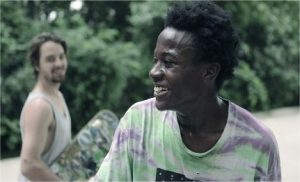REVIEW: ‘Minding the Gap’ is a touching, masterful coming-of-age tale

In “Minding the Gap,” director and producer Bing Liu tells the story of three friends’ struggles with intergenerational trauma, domestic abuse and toxic masculinity through the lens of skateboarding culture. (Photo from Hulu)
From the battered streets of Rockford, Ill. and the mind of one of its natives — director, producer and cinematographer Bing Liu — comes “Minding the Gap,” a profound documentary feature exploring skateboarding culture, toxic masculinity and so much more. The character-driven verite film follows four years in the lives of 16-year-old Keire, 23-year-old Zack and Liu as the band of outcasts finds solace from their broken home lives in the streets and in each other.
What starts as a seemingly jaunty and boyish film, featuring montages of the friends’ skateboarding antics and teenage squabbles, soon takes an unexpected direction as its protagonists approach the precipice of manhood.
For Keire, this means grappling with thedeath of his abusive father and growing into his African American identity amid a circle of white childhood friends. Zack’s transitional moment comes when his girlfriend Nina gets pregnant and he is forced to find a way to provide for his family with limited education, few resources and no role models to speak of. And Liu, who previously only existed behind the camera, begins to weave himself into the subjects and themes of the film, drawing from his similarly toxic background and undergoing his own healing process. Forming an interracial brotherhood of misfits, the three young men gradually confront their pasts in their own ways.
In the beginning, skateboarding is described by one friend as “more of a family than my family” — more precisely defined by the maxim Keire has on his board: “This device cures heartbreak.” But eventually, as adulthood begins to tighten its grip on their lives, it becomes clear that skateboarding and the reprise from reality it offers cannot protect them forever. Their efforts to escape their problems by horsing around in skate parks seamlessly develop into a tale of intergenerational trauma, domestic violence and the pitfalls of masculinity.

Released on Aug. 17 on Hulu, Bing Liu’s character-driven vérité film “Minding the Gap” portrays skateboarding as an intimate escape from the traumas and stresses of everyday life in a suburban setting. (Photo from Hulu)
The cyclicality of these themes touches the story in various ways — from Liu tearfully confronting his own mother about his abusive stepfather to the revelation that Zack has become violent toward Nina in the throes of his alcoholism. As the years pass and the characters age, Keire becomes increasingly desperate to liberate himself from the decrepit small town while Zack begins to consider how his life decisions are affecting his son. By the end, both are virtually unrecognizable from the goofy kids audiences are introduced to, yet their passions for skateboarding persist throughout and continue to be central to their identities.
As for Liu, he achieves a newfound sense of clarity about his own childhood and learns to process the past through autobiographical storytelling. It is refreshingly organic to not only hear Liu the filmmaker look into the other characters’ lives as a concerned friend but also to see him become an active and vulnerable participant in the story. Liu’s central involvement in the narrative is raw and honest, a nuance that would not be possible if he were merely an observer.
“Minding the Gap” is a stunning portrait of stale suburbia, late-adolescent boys becoming men and the sprawling consequences of domestic violence. It flings open a doorway into abuse and the male psyche while telling an optimistic tale of young people surviving their situations and going on to forge meaningful lives for themselves. Though framed by skateboarding, the film achieves a mature poignancy through its deeply intimate tone and its audacity to explore both the anguish and exhilaration of growing up.
